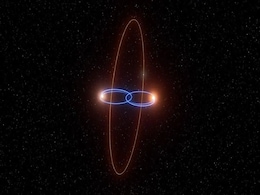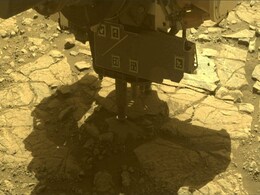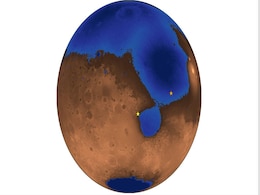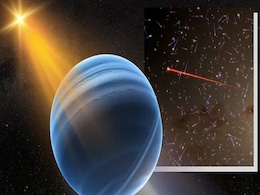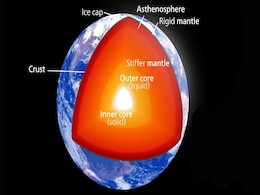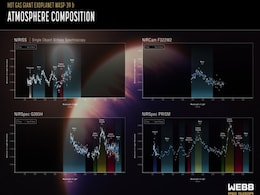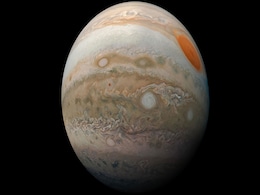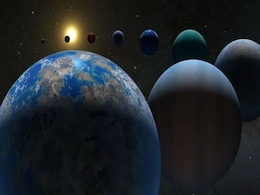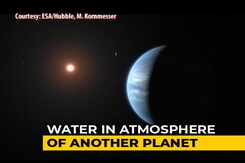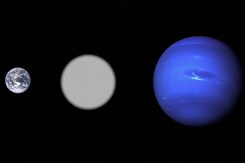Planet Discovered
- All
- News
- Videos
- Web Stories
-

Earth Day 2025: Dress For The Planet, Not Just For The Moment
- Tuesday April 22, 2025
- Ravisha Poddar
Celebrate Earth Day 2025 by making your wardrobe planet-friendly. Discover why sustainable fashion matters and how small, stylish changes can make a big difference.
-
 www.ndtvshopping.com
www.ndtvshopping.com
-

NASA Curiosity Rover Potentially Deciphers Mars’ Missing Carbonate Mystery
- Friday April 18, 2025
- Written by Gadgets 360 Staff
NASA’s Curiosity rover potentially ended the mystery of the ancient atmosphere and missing carbonates. The research uncovers the potential reasons behind the temperature of the planet Mars and how it has supported the liquid water on the planet. Explore the findings and the discoveries made by NASA’s Curiosity rover.
-
 www.gadgets360.com
www.gadgets360.com
-

Bizzare 'Failed Star' Planet Orbiting Double Star System in Milky Way Discovered by Researchers
- Thursday April 17, 2025
- Written by Gadgets 360 Staff
Astronomers have discovered an exoplanet 90 degrees tilted around a special pair of eclipsing brown dwarfs. This uncommon "polar planet" challenges accepted wisdom on planet creation by presenting new insights on the dynamics of binary stars and the range of Milky Way planetary orbits.
-
 www.gadgets360.com
www.gadgets360.com
-

NASA’s Perseverance Rover Discovers a Large Number of Unique Rock Samples on Jezero Crater’s Rim
- Thursday April 17, 2025
- Written by Gadgets 360 Staff
NASA's Perseverance rover is exploring the Martian rim of Jezero Crater, a crater filled with rocky outcrops. The mission has cored five rocks, performed up-close analysis of seven rocks, and analysed another 83 from afar using a laser. The diversity of rocks found has exceeded expectations, with tons of fragmented once-molten rocks and formerly un...
-
 www.gadgets360.com
www.gadgets360.com
-

Two New Exoplanets Found Orbiting a Star in Draco Constellation
- Wednesday April 2, 2025
- Written by Gadgets 360 Staff
Astronomers have identified two exoplanets, TOI-1453 b and TOI-1453 c, orbiting a star 250 light-years away in Draco. The planets, a super-Earth and a sub-Neptune, were detected using NASA’s TESS satellite and the HARPS-N spectrograph. TOI-1453 b is a rocky planet orbiting close to its star, while TOI-1453 c is twice Earth’s size and may have a...
-
 www.gadgets360.com
www.gadgets360.com
-

Ancient Martian Ocean Shoreline Discovered Beneath Surface by Zhurong Rover
- Monday March 3, 2025
- Written by Gadgets 360 Staff
China's Zhurong rover has uncovered evidence of an ancient ocean on Mars, with ground-penetrating radar detecting a buried shoreline beneath the Utopia Basin. The rover’s scans revealed sloping sand layers similar to those found on Earth’s beaches, reinforcing theories of long-term water presence. Experts highlight that these formations are not...
-
 www.gadgets360.com
www.gadgets360.com
-

Exoplanet WASP-121 b’s Atmosphere Features Iron Rains, Jet Streams, and More
- Thursday February 20, 2025
- Written by Gadgets 360 Staff
Astronomers have uncovered extreme weather patterns on WASP-121 b, a gas giant 900 light-years from Earth. The planet experiences iron rain, with metals vaporizing on its scorching dayside and condensing into liquid at night. Supersonic winds carry elements across its atmosphere, forming powerful jet streams. Using the Very Large Telescope, researc...
-
 www.gadgets360.com
www.gadgets360.com
-

New Seismic Data Challenges Earth's Inner Core Structure, Reveals Surprising Findings
- Wednesday February 19, 2025
- Written by Gadgets 360 Staff
Recent seismic data from 121 earthquakes recorded over three decades challenges previous beliefs about Earth's inner core. Researchers from the University of Southern California discovered structural changes in the core, suggesting it may not be as solid as once thought. These anomalies, observed while studying the core's slowing rotation, could of...
-
 www.gadgets360.com
www.gadgets360.com
-

A Neptune-Like Exoplanet Is Racing Through Space at Record Speed
- Monday February 17, 2025
- Written by Gadgets 360 Staff
Scientists have detected an exoplanet racing through space at 1.2 million mph, making it the fastest known planet. The Neptune-sized world orbits a hypervelocity star, first hinted at in 2011 via gravitational microlensing. Astronomers, using Keck Observatory and Gaia data, have confirmed the system’s extreme speed, suggesting it may even leave t...
-
 www.gadgets360.com
www.gadgets360.com
-

Scientists Uncover 'Sunken Worlds' Deep in Earth’s Mantle, Defying Geological Expectations
- Tuesday January 21, 2025
- Written by Gadgets 360 Staff
A new study has uncovered unusual anomalies deep within Earth's mantle, resembling sunken crustal slabs in unexpected locations. Using advanced full-waveform inversion, scientists were able to map these structures, revealing hidden patterns that challenge current geological understanding. These anomalies were discovered far from tectonic activity z...
-
 www.gadgets360.com
www.gadgets360.com
-

NASA's TESS Discovers Fastest Disintegrating Planet Ever Seen: What You Need to Know
- Monday January 20, 2025
- Written by Gadgets 360 Staff
NASA’s TESS has observed the closest and fastest disintegrating planet, BD+05 4868 Ab, located 141 light-years away. The planet loses a moon’s mass every million years as it is bombarded by its host star. Scientists are examining its massive dust trails, offering rare insights into the composition of terrestrial exoplanets. Researchers from MIT...
-
 www.gadgets360.com
www.gadgets360.com
-

Astronomers Discover Water and Carbon Dioxide in WASP-166 b's Atmosphere
- Saturday January 11, 2025
- Written by Gadgets 360 Staff
Astronomers have detected water and carbon dioxide in the atmosphere of WASP-166 b, a hot super-Neptune exoplanet. Using data from the James Webb Space Telescope (JWST), the findings also noted ammonia in smaller quantities. WASP-166 b, located 368 light-years away, is a massive planet that orbits its star every 5.44 days, with a temperature of 1,2...
-
 www.gadgets360.com
www.gadgets360.com
-

Amateur Astronomer Discovers Unexpected Composition of Jupiter’s Clouds
- Saturday January 11, 2025
- Written by Gadgets 360 Staff
Recent observations by an amateur astronomer reveal that Jupiter’s clouds may not consist of ammonia ice as previously assumed. Using a technique called band-depth analysis, Steve Hill mapped ammonia concentrations in the planet’s atmosphere, finding reflective layers deeper than expected. These findings suggest the clouds may be composed of am...
-
 www.gadgets360.com
www.gadgets360.com
-

Newly Discovered Oxygen Reaction Existed in Primitive Atmosphere, Sheds Light on Origin of Life
- Saturday January 4, 2025
- Written by Gadgets 360 Staff
Scientists have uncovered a new way oxygen could form in carbon dioxide-rich atmospheres without the involvement of life. The discovery, led by researchers from the University of Science and Technology of China, shows that a reaction between helium ions and CO2 can produce molecular oxygen. This process challenges traditional methods of life detect...
-
 www.gadgets360.com
www.gadgets360.com
-

Organic Molecules in Space: A Key to Understanding Life's Cosmic Origins
- Saturday December 28, 2024
- Written by Gadgets 360 Staff
Organic molecules, the building blocks of life, have been discovered across space—from interstellar clouds to asteroids and comets. Findings from missions like Rosetta, Hayabusa2, and Osiris-Rex reveal that these compounds existed long before the Sun formed. Scientists believe organic molecules survived planetary formation in protoplanetary disks...
-
 www.gadgets360.com
www.gadgets360.com
-

Earth Day 2025: Dress For The Planet, Not Just For The Moment
- Tuesday April 22, 2025
- Ravisha Poddar
Celebrate Earth Day 2025 by making your wardrobe planet-friendly. Discover why sustainable fashion matters and how small, stylish changes can make a big difference.
-
 www.ndtvshopping.com
www.ndtvshopping.com
-

NASA Curiosity Rover Potentially Deciphers Mars’ Missing Carbonate Mystery
- Friday April 18, 2025
- Written by Gadgets 360 Staff
NASA’s Curiosity rover potentially ended the mystery of the ancient atmosphere and missing carbonates. The research uncovers the potential reasons behind the temperature of the planet Mars and how it has supported the liquid water on the planet. Explore the findings and the discoveries made by NASA’s Curiosity rover.
-
 www.gadgets360.com
www.gadgets360.com
-

Bizzare 'Failed Star' Planet Orbiting Double Star System in Milky Way Discovered by Researchers
- Thursday April 17, 2025
- Written by Gadgets 360 Staff
Astronomers have discovered an exoplanet 90 degrees tilted around a special pair of eclipsing brown dwarfs. This uncommon "polar planet" challenges accepted wisdom on planet creation by presenting new insights on the dynamics of binary stars and the range of Milky Way planetary orbits.
-
 www.gadgets360.com
www.gadgets360.com
-

NASA’s Perseverance Rover Discovers a Large Number of Unique Rock Samples on Jezero Crater’s Rim
- Thursday April 17, 2025
- Written by Gadgets 360 Staff
NASA's Perseverance rover is exploring the Martian rim of Jezero Crater, a crater filled with rocky outcrops. The mission has cored five rocks, performed up-close analysis of seven rocks, and analysed another 83 from afar using a laser. The diversity of rocks found has exceeded expectations, with tons of fragmented once-molten rocks and formerly un...
-
 www.gadgets360.com
www.gadgets360.com
-

Two New Exoplanets Found Orbiting a Star in Draco Constellation
- Wednesday April 2, 2025
- Written by Gadgets 360 Staff
Astronomers have identified two exoplanets, TOI-1453 b and TOI-1453 c, orbiting a star 250 light-years away in Draco. The planets, a super-Earth and a sub-Neptune, were detected using NASA’s TESS satellite and the HARPS-N spectrograph. TOI-1453 b is a rocky planet orbiting close to its star, while TOI-1453 c is twice Earth’s size and may have a...
-
 www.gadgets360.com
www.gadgets360.com
-

Ancient Martian Ocean Shoreline Discovered Beneath Surface by Zhurong Rover
- Monday March 3, 2025
- Written by Gadgets 360 Staff
China's Zhurong rover has uncovered evidence of an ancient ocean on Mars, with ground-penetrating radar detecting a buried shoreline beneath the Utopia Basin. The rover’s scans revealed sloping sand layers similar to those found on Earth’s beaches, reinforcing theories of long-term water presence. Experts highlight that these formations are not...
-
 www.gadgets360.com
www.gadgets360.com
-

Exoplanet WASP-121 b’s Atmosphere Features Iron Rains, Jet Streams, and More
- Thursday February 20, 2025
- Written by Gadgets 360 Staff
Astronomers have uncovered extreme weather patterns on WASP-121 b, a gas giant 900 light-years from Earth. The planet experiences iron rain, with metals vaporizing on its scorching dayside and condensing into liquid at night. Supersonic winds carry elements across its atmosphere, forming powerful jet streams. Using the Very Large Telescope, researc...
-
 www.gadgets360.com
www.gadgets360.com
-

New Seismic Data Challenges Earth's Inner Core Structure, Reveals Surprising Findings
- Wednesday February 19, 2025
- Written by Gadgets 360 Staff
Recent seismic data from 121 earthquakes recorded over three decades challenges previous beliefs about Earth's inner core. Researchers from the University of Southern California discovered structural changes in the core, suggesting it may not be as solid as once thought. These anomalies, observed while studying the core's slowing rotation, could of...
-
 www.gadgets360.com
www.gadgets360.com
-

A Neptune-Like Exoplanet Is Racing Through Space at Record Speed
- Monday February 17, 2025
- Written by Gadgets 360 Staff
Scientists have detected an exoplanet racing through space at 1.2 million mph, making it the fastest known planet. The Neptune-sized world orbits a hypervelocity star, first hinted at in 2011 via gravitational microlensing. Astronomers, using Keck Observatory and Gaia data, have confirmed the system’s extreme speed, suggesting it may even leave t...
-
 www.gadgets360.com
www.gadgets360.com
-

Scientists Uncover 'Sunken Worlds' Deep in Earth’s Mantle, Defying Geological Expectations
- Tuesday January 21, 2025
- Written by Gadgets 360 Staff
A new study has uncovered unusual anomalies deep within Earth's mantle, resembling sunken crustal slabs in unexpected locations. Using advanced full-waveform inversion, scientists were able to map these structures, revealing hidden patterns that challenge current geological understanding. These anomalies were discovered far from tectonic activity z...
-
 www.gadgets360.com
www.gadgets360.com
-

NASA's TESS Discovers Fastest Disintegrating Planet Ever Seen: What You Need to Know
- Monday January 20, 2025
- Written by Gadgets 360 Staff
NASA’s TESS has observed the closest and fastest disintegrating planet, BD+05 4868 Ab, located 141 light-years away. The planet loses a moon’s mass every million years as it is bombarded by its host star. Scientists are examining its massive dust trails, offering rare insights into the composition of terrestrial exoplanets. Researchers from MIT...
-
 www.gadgets360.com
www.gadgets360.com
-

Astronomers Discover Water and Carbon Dioxide in WASP-166 b's Atmosphere
- Saturday January 11, 2025
- Written by Gadgets 360 Staff
Astronomers have detected water and carbon dioxide in the atmosphere of WASP-166 b, a hot super-Neptune exoplanet. Using data from the James Webb Space Telescope (JWST), the findings also noted ammonia in smaller quantities. WASP-166 b, located 368 light-years away, is a massive planet that orbits its star every 5.44 days, with a temperature of 1,2...
-
 www.gadgets360.com
www.gadgets360.com
-

Amateur Astronomer Discovers Unexpected Composition of Jupiter’s Clouds
- Saturday January 11, 2025
- Written by Gadgets 360 Staff
Recent observations by an amateur astronomer reveal that Jupiter’s clouds may not consist of ammonia ice as previously assumed. Using a technique called band-depth analysis, Steve Hill mapped ammonia concentrations in the planet’s atmosphere, finding reflective layers deeper than expected. These findings suggest the clouds may be composed of am...
-
 www.gadgets360.com
www.gadgets360.com
-

Newly Discovered Oxygen Reaction Existed in Primitive Atmosphere, Sheds Light on Origin of Life
- Saturday January 4, 2025
- Written by Gadgets 360 Staff
Scientists have uncovered a new way oxygen could form in carbon dioxide-rich atmospheres without the involvement of life. The discovery, led by researchers from the University of Science and Technology of China, shows that a reaction between helium ions and CO2 can produce molecular oxygen. This process challenges traditional methods of life detect...
-
 www.gadgets360.com
www.gadgets360.com
-

Organic Molecules in Space: A Key to Understanding Life's Cosmic Origins
- Saturday December 28, 2024
- Written by Gadgets 360 Staff
Organic molecules, the building blocks of life, have been discovered across space—from interstellar clouds to asteroids and comets. Findings from missions like Rosetta, Hayabusa2, and Osiris-Rex reveal that these compounds existed long before the Sun formed. Scientists believe organic molecules survived planetary formation in protoplanetary disks...
-
 www.gadgets360.com
www.gadgets360.com



